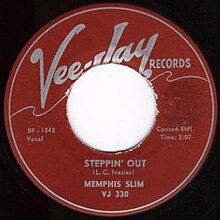
Eric Patrick Clapton, is an English rock and blues guitarist, singer, and songwriter. He is the only three-time inductee to the Rock and Roll Hall of Fame: once as a solo artist and separately as a member of the Yardbirds and of Cream. Clapton has been referred to as one of the most important and influential guitarists of all time. Clapton ranked second in Rolling Stone's list of the "100 Greatest Guitarists of All Time" and fourth in Gibson's "Top 50 Guitarists of All Time". He was also named number five in Time magazine's list of "The 10 Best Electric Guitar Players" in 2009.
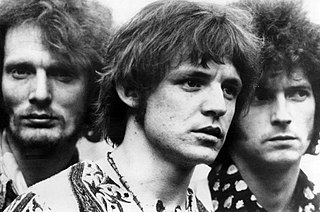
Cream were a British rock band formed in London in 1966. The group consisted of bassist Jack Bruce, guitarist Eric Clapton, and drummer Ginger Baker. Bruce was the primary songwriter and vocalist, although Clapton and Baker also sang and contributed songs. Formed from members of previously successful bands, they are widely regarded as the world's first supergroup. Cream were highly regarded for the instrumental proficiency of each of their members. Tensions between Bruce and Baker led to their decision in May 1968 to break up, though the band were persuaded to make a final album, Goodbye, and to tour, culminating in two final farewell concerts at the Royal Albert Hall on 25 and 26 November 1968 which were filmed by the BBC and shown in theatres, then in 1977 released as a home video, Farewell Concert.
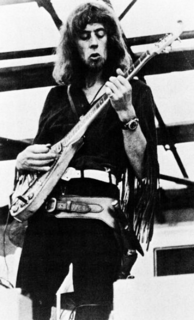
John Mayall & the Bluesbreakers are an English blues rock band, led by singer, songwriter, and multi-instrumentalist John Mayall. While never producing a radio-friendly hit on their own, the Bluesbreakers' greatest legacy is as an incubator for British rock and blues musicians. Many of the best known bands to come out of Britain in the 1960s and 1970s had members that came through the Bluesbreakers at one time, forming the foundation of British blues music that still appears heavily in classic rock radio. Among those with a tenure in the Bluesbreakers are Eric Clapton and Jack Bruce, Peter Green, Mick Fleetwood, and John McVie, Mick Taylor, Aynsley Dunbar, and numerous other musicians.

John Mayall, OBE is an English blues singer, guitarist, organist and songwriter, whose musical career spans over sixty years. In the 1960s, he was the founder of John Mayall & the Bluesbreakers, a band which has counted among its members some of the most famous blues and blues rock musicians.

John Symon Asher Bruce was a Scottish bassist, singer-songwriter, musician and composer. He gained popularity as the co-lead vocalist and bass guitarist of British rock band Cream. After the group disbanded in 1968, he pursued a solo career and also played with several bands.
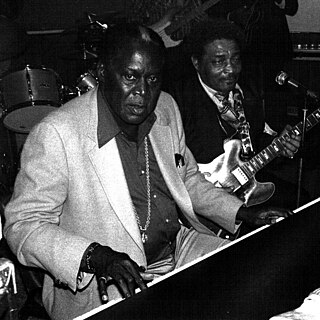
Memphis Slim was an American blues pianist, singer, and composer. He led a series of bands that, reflecting the popular appeal of jump blues, included saxophones, bass, drums, and piano. A song he first cut in 1947, "Every Day I Have the Blues", has become a blues standard, recorded by many other artists. He made over 500 recordings.

Five Live Yardbirds is the live debut album by English rock band the Yardbirds. It features the group's interpretations of ten American blues and rhythm and blues songs, including their most popular live number, Howlin' Wolf's "Smokestack Lightning". The album contains some of the earliest recordings with guitarist Eric Clapton.

BBC Sessions is a live album by the British rock band Cream, released on 25 May 2003 on Polydor Records. It contains 22 tracks and 4 interviews recorded live at the BBC studios in London.
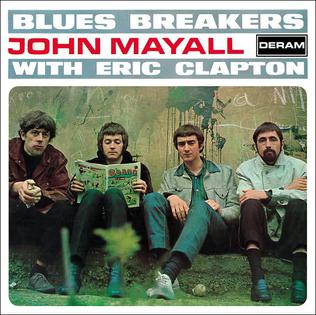
Blues Breakers with Eric Clapton, colloquially known as The Beano Album, is a studio album by the English blues rock band John Mayall and the Bluesbreakers. Produced by Mike Vernon and released in 1966 by Decca Records (UK) and London Records (US), it pioneered a guitar-dominated blues-rock sound.

Live Cream Volume II is the second live album by the British rock band Cream, released in March 1972 by Polydor Records. This album contains six tracks recorded at various performances from 9 March to 4 October 1968.
James C. Bracken was an American songwriter and the co-founder and co-owner of Vee-Jay Records with his wife Vivian and her brother, Calvin Carter.
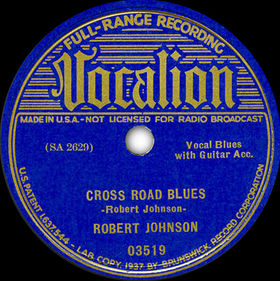
"Cross Road Blues" is a blues song written and recorded by American blues artist Robert Johnson in 1936. Johnson performed it as a solo piece with his vocal and acoustic slide guitar in the Delta blues-style. The song has become part of the Robert Johnson mythology as referring to the place where he supposedly sold his soul to the Devil in exchange for his musical talents, although the lyrics do not contain any specific references.
Eric Clapton and the Powerhouse was a British blues rock studio group formed in 1966. They recorded three songs, which were released on the Elektra Records sampler album What's Shakin' in 1966. A possible fourth song remained unreleased.
Michael William Hugh Vernon is an English music executive studio owner, and record producer from Harrow, Middlesex. He produced albums for British blues artists and groups in the 1960s, working with the Bluesbreakers, David Bowie, Duster Bennett, Savoy Brown, Chicken Shack, Climax Blues Band, Eric Clapton, Fleetwood Mac, Peter Green, Danny Kirwan, John Mayall, Christine McVie and Ten Years After amongst others.

What's Shakin' is a compilation album released by Elektra Records in June 1966. It features the earliest studio recordings by the Lovin' Spoonful and the Paul Butterfield Blues Band, as well as the only released recordings by the ad hoc studio group Eric Clapton and the Powerhouse, until they were reissued years later.

Farewell Concert is the live recording of the band Cream's final concert at the Royal Albert Hall on 26 November 1968. Aside from the band's reunion concert in 2005 it is Cream's only official full concert release on video. It was originally broadcast by the BBC on 5 January 1969. It was not released on video in the US until 1977. The opening acts for the concert were future progressive rock stars Yes who were just starting out and Taste, an Irish trio led by Rory Gallagher.

Steppin' Out is a compilation album of songs featuring Eric Clapton, released in 1981. It contains eight of the 12 tracks that appeared originally on John Mayall's Blues Breakers with Eric Clapton in 1966, plus a Mayall/Clapton single, "Lonely Years," two tracks from a 1966 recording session by Champion Jack Dupree on which Clapton played guitar, and "Pretty Girls Everywhere", which is from an Otis Spann session, also featuring Clapton.
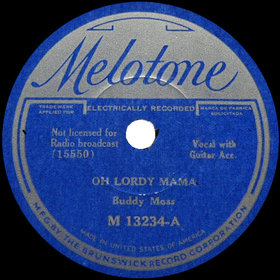
"Hey Lawdy Mama" is a Piedmont blues song recorded by Buddy Moss in 1934. The song became popular among jazz musicians with early recordings by Count Basie and Louis Armstrong. In 1943, a version recorded by Andy Kirk and His Twelve Clouds of Joy, with vocals by June Richmond, was a hit, reaching number four on the Billboard R&B chart.

"I Can't Hold Out", also known as "Talk to Me Baby", is a blues song written by Willie Dixon and recorded by Elmore James in 1960 for the Chess label. Called a classic and a "popular James standard", it has been interpreted and recorded by a variety of artists.
